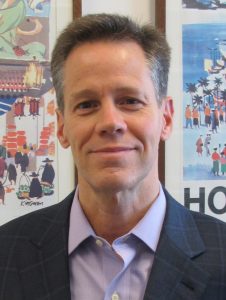We are delighted to announce that our Blog is starting a new series! In this series, we ask the same set of six questions to scholars with a common interest in Hong Kong from different disciplines.

Our inaugural interviewee is Prof. John Carroll, Associate Dean of the Faculty of Arts at the University of Hong Kong. Prof. Carroll spent his childhood and teenage years in North Point and Causeway Bay before he moved to the US for his undergraduate study. Author of Edge of Empires and bestseller A Concise History of Hong Kong 香港簡史, he has reorientated the study of Hong Kong history to stand between the history of China and British imperialism.
HKHP: How did this all begin? (Your research interests, your career, or your life in Hong Kong, etc.)
JC: It was an accident – and I do mean an accident. Although I was raised and educated in Hong Kong, I never had any interest in its history. It wasn’t taught in my primary or secondary school, and we never went on any field trips. I think I visited the Hong Kong Museum of History, then in Star House, exactly once. When I began the research for my PhD thesis back in the early 1990s, Hong Kong was the last place on my mind. I was interested in Western missionaries in China and treaty-port culture in Shanghai. At some point I decided to read a bit about Hong Kong. The more I learned, the more interesting it became. The rest, as they say, is history.
HKHP: What needs to be further explored in Hong Kong studies?
JC: I don’t think there’s any particular “missing link”. No two people will ever agree on what is most important about any place or period. But, speaking of people, those who need to be incorporated much more thoroughly into Hong Kong history are the South Asians. How such vibrant communities with roots dating back to Hong Kong’s earliest days as a colony have been so overlooked is truly baffling. In terms of periods, one that could use more work is the 1950s.
HKHP: How do you see Hong Kong’s place in the study of history?
JC: When I started my PhD research many years ago, I wanted to use the case of Hong Kong as a way to understand certain issues in modern Chinese history, such as the rise of modern capitalism, state and society, and Sino-Western cultural encounters. Then I started to see it as a way of understanding colonialism. Now I see it mainly as a place on its own terms, and with its own unique characteristics.
HKHP: What do you think would be the biggest challenge facing Hong Kong studies? How can we solve it?
JC: The biggest challenge is the language gap. Walk into any major bookstore here and you’ll see a huge body of work that many people will never be able to read. Some of the best material on Hong Kong in the 1960s and 1970s is in Chinese, and why shouldn’t it be? Imagine trying to understand France without reading French. And it’s not just a matter of reading: can we really understand a society without understanding its pop culture and – of course – its slang? I grew up immersed in Hong Kong pop culture and slang, and it’s still hard for me to get by. Another problem is that, at least at the university level, historical research is usually framed by nation. Except perhaps here in Hong Kong, no one gets a PhD in Hong Kong history: it has to be in Chinese history or British imperial history. And, except perhaps in Hong Kong, academic jobs are never in Hong Kong history. I can’t imagine that ever changing.
HKHP: Could you please share with us your favorite quote/person/book that you came across while doing primary research?
JC: The most interesting person I’ve ever come across while doing primary research is James Innes, a fiercely libertarian Scottish trader who arrived in Canton around 1825 and died in Macao in July 1841 during the Opium War. He didn’t survive long enough to live in Hong Kong, but he certainly would have made the place even more interesting if he had. I don’t think I would have liked him very much, but he would have been a fun person to share a glass or two of Scotch whisky with. He once publicly threatened to shoot Captain Charles Elliot, superintendent of British trade in China, “through the head, or heart, by a well practised rifle.”
HKHP: What are you working on now?
JC: I’m trying to finish two books on the British in Canton before the Opium War. One is about communities, people (including James Innes), and institutions. The other is about the knowledge of China produced by Britons who resided in or travelled through Canton. And I’ve just started research for another book on Hong Kong, which looks at how from 1949 to 1997 local authorities tried to promote tourism in Britain’s only Chinese colony, and by the 1990s its only significant colony.